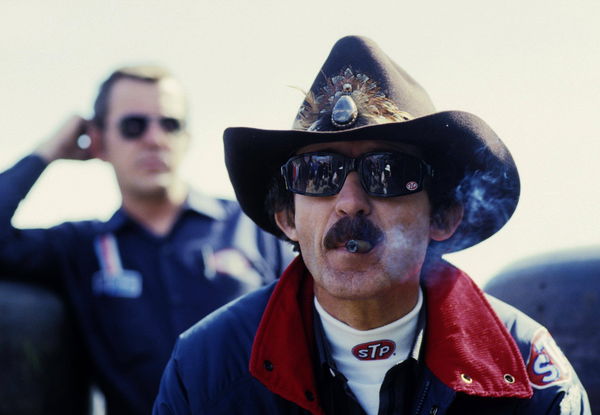
via Imago
US PRESSWIRE Sports Archive Feb 17, 1985 Daytona Bch, FL, USA FILE PHOTO NASCAR, Motorsport, USA Winston Cup driver Richard Petty during the Daytona 500 at the Daytona International Speedway. Daytona Beach Florida UNITED STATES, EDITORIAL USE ONLY PUBLICATIONxINxGERxSUIxAUTxONLY Copyright: xMannyxRubio-USAxTODAYxSportsx 3936073

via Imago
US PRESSWIRE Sports Archive Feb 17, 1985 Daytona Bch, FL, USA FILE PHOTO NASCAR, Motorsport, USA Winston Cup driver Richard Petty during the Daytona 500 at the Daytona International Speedway. Daytona Beach Florida UNITED STATES, EDITORIAL USE ONLY PUBLICATIONxINxGERxSUIxAUTxONLY Copyright: xMannyxRubio-USAxTODAYxSportsx 3936073
“I remember Bill France Jr. telling me it would change the sport forever.” Long-time Cup driver Jimmy Spencer said in a 2023 interview recollecting a forgotten time when tobacco fueled NASCAR races. The sport’s 76-year history was brightened by the presence of R. J. Reynolds Tobacco Company and its popular Winston cigarette brand. Although restrictions are multifold about tobacco consumption at present, how can we forget NASCAR’s golden era?
Richard Petty was an integral part of that time. He worked on his uncle’s tobacco farm when he was a boy and chewed tobacco, dipped snuff, and smoked cigars in his prime. But what is more important, tobacco helped make him rich and famous – as he ran the Winston Cup Series and accumulated bountiful victories.
Richard Petty narrates a ‘smoking’ story
ADVERTISEMENT
Article continues below this ad
Although NASCAR debuted in 1949, for the next two decades, its Grand National Schedule was frozen at another time. The 48-race schedule was too unwieldy and tied to shorter, smaller tracks with little or no national impact. But the sport’s fate changed after federal legislation derailed cigarette advertising on television. RJR shifted its advertising to the racetrack, helping grow stock car racing from a regional curiosity into a national phenomenon. From 1971 to 2003, the NASCAR-RJR nexus presented the most powerful sponsorship deal. And icons like Richard Petty benefited from it.
So, in a recent recollection of past times, the King talked about that historic signing in a NASCAR video. “They said, we just got off TV and we’ve got millions of dollars that we want to spend. Junior Johnson sent them to Bill France, to NASCAR, and they sat down and they cut a deal.” Those millions quickly saw results.
Purses at Cup tracks grew, and incentives came like the Winston Million, a $1 million prize offered to a driver who could clinch three of the marquee events – Daytona 500, Winston 500 (at Talladega), Coca-Cola 600, and Southern 500. So Richard Petty added with a smile: “We definitely looked at it as a good thing because when they came in, they started paying more money.”
RJR also revolutionized the sport – cutting down 48 races to 31 in 1972. It dumped millions into speedway improvements and wanted to branch out of traditional tracks. “Up to that time, we ran Rockingham, we ran Charlotte, Martinsville, Wilkesboro. They said well, no need of us advertising to the same people…With this much money, we want to go to California, we want to go to New York. We want to make a national sport out of it because we’re spending all this money.”
What’s your perspective on:
Did tobacco sponsorship truly elevate NASCAR, or was it just a necessary evil for the sport's growth?
Have an interesting take?

Richard Petty compared this financial boom to earlier times when racers’ ambitions were low. “We were just working out behind the house. Everybody had a little shop where they worked on cars. People didn’t really look at the money if they had enough to get to the next race, they were just happy as June bugs.”
Although since 1998 the Master Settlement Agreement restricted tobacco brands in their advertising scope, NASCAR’s tobacco association will always be legendary. Another prominent Cup veteran recalled the Winston brand’s contribution to growing the sport.
ADVERTISEMENT
Article continues below this ad
The “biggest” moment in NASCAR
Trending
F1 Community Rages at Danica Patrick’s Return as Sky Sports Snubs Ex-World Champ for Her

Tony Stewart’s Wife Leah Pruett Pens a Heartfelt Message for Husband After His Unwavering Support for His Family

“We Are Not Morning People”- Travel Woes Hit Home for Kyle Busch & Wife Samantha Leaving Son Brexton Grinning

Unimpressed NASCAR Fans Call Out Chase Elliott’s 7th Consecutive MPD Award Sweep Amid Rekindled Dating Fire

Denny Hamlin’s One Final FedEx Tribute Steals the NASCAR Awards Spotlight as He Uncovers Drivers ‘Disgruntled’ Emotions

As Richard Petty said, RJR’s entry into NASCAR brought money to the sport. And that financial capital was used to grow stock car racing in varied ways. The tobacco brand invested millions in widespread and business-smart promotion of NASCAR in terms of – public relations and communications presence. The resulting professionalism and thoroughness were rarely seen before. Printing NASCAR media guides, holding the Winston Cup preview, and conducting autograph-signing events were all part of the plan. RJR also moved NASCAR’s annual Cup Series end-of-season awards banquet to the Waldorf-Astoria Hotel in New York City.
So Richard Childress, owning a 117-time Cup race-winning team, chimed with Richard Petty’s take. He told NBC Sports in a 2023 interview: “I’ve been in this sport 50-plus years, and there have been some big moments. R.J. Reynolds coming in was certainly one of the biggest. They brought in paint and built buildings and brought in media from all over the United States. And the billboards. I remember going to North Wilkesboro, and there was a big billboard about Winston and the race. That was a big deal back in the day – stuff that we never had before.”
ADVERTISEMENT
Article continues below this ad
Evidently, the Winston tobacco brand is forever etched in NASCAR history. Richard Petty and his compatriots shot to fame and popularity largely due to RJR’s efforts.
Have something to say?
Let the world know your perspective.


Debate
Did tobacco sponsorship truly elevate NASCAR, or was it just a necessary evil for the sport's growth?